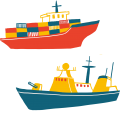

The German navy wades into the waters of the Taiwan Strait
For the first time in over 20 years, two German navy ships passed the Taiwan Strait in September, amid Chinese protests. For Berlin, this is the right way to go.
“International waters are international waters. We are sailing through.” With these words, Germany’s Defense Minister Boris Pistorius announced that the two German navy vessels currently on deployment to the Indo-Pacific would sail through the Taiwan Strait on September 13, marking the first German passage through the Strait in over 20 years.
This is a big step forward for Germany’s foreign policy. The decision shows true follow-through on the purported goals of the country’s ongoing Indo-Pacific deployment: to demonstrate Germany’s commitment to free and secure shipping lanes and the rules-based international order. And it signals a new willingness in Berlin to take measures that might anger Beijing.
Germany’s change of course
The German navy’s decision to restart deployments to the Indo-Pacific in 2021, after a pause of about two decades, speaks to the new recognition of the region’s importance for Germany’s (and Europe’s) interests and security. Three years ago, however, Berlin went out of its way to prevent friction with China, by avoiding sailing through contested waters in the South China Sea or the Taiwan Strait, and even by requesting a port call in Shanghai (the request that was eventually turned down by Beijing).
But things have changed since then. Views of China have worsened across Europe, in no small part due to Beijing’s support for Moscow since it launched its full-scale war against Ukraine in February 2022. And concerns have grown over the gradual erosion of the rules-based international order and the growing risk of escalation in the region, as China steps up its military activities around Taiwan and the Philippines, underlining its expansive territorial claims to its neighborhood.
Beefed-up deployment
This year’s beefed-up Indo-Pacific deployment, and the Taiwan Strait passage, must be seen in this context. The frigate Baden-Württemberg and replenishment ship Frankfurt am Main departed Europe in early May in a deployment that has seen them participate in the US-led Rim of the Pacific (RIMPAC) exercise and in UN-mandated operations to enforce sanctions against North Korea. After sailing through the Taiwan Strait, and then the South China Sea, the ships will head for port calls in the Philippines, Indonesia, and Singapore on their way back to Germany.
Thus, Berlin is clearly signaling that it stands in support of international law and freedom of navigation. If left unchecked, the erosion of international law caused by China’s actions in the region could have a serious impact not only on peace and stability, but also on trade routes and supply chains that Germany and Europe depend on. This might help explain the statement by the German Federation of Industries (BDI) in support of the decision to sail through the Strait. Consistently going through the Strait can also contribute to deterrence against potential Chinese actions against Taiwan or elsewhere in the region.
Such a deployment also brings military and operational benefits to the Bundeswehr. Besides the new training opportunities in unfamiliar settings, regular deployments to the Indo-Pacific can also help improve the German navy’s interoperability with partners and logistical capabilities, which would help with preparedness in case of future conflicts in the region.
By stepping up its presence in the Indo-Pacific and sailing through contested waters in the face of Chinese opposition, Berlin is also hoping to strengthen ties with regional partners and to build up Germany’s—and Europe’s—credibility in the Indo-Pacific, by signaling that it is invested in what goes on in the region and is willing to contribute in order to preserve stability. Germany is by no means the first European country to have come to this conclusion—a few other European and like-minded navies have sailed through the Taiwan Strait in the past few years. (The US navy sails through the Taiwan Strait regularly, but they are not the only ones: The Dutch navy sailed through in June, Canada in August, and France back in 2023. The British navy sailed through the Strait for the last time in 2021, but is planning on returning next year.)
China hits back
Beijing is angry at Germany’s decision, but retaliation will likely remain limited to a few angry-worded statements, in line with Beijing’s reactions to the French, Dutch or Canadian navies going through. Besides, China’s leadership is not interested in further damaging its ties with Europe, at a time when all its attention is focused on trying to prevent the approval of permanent European Union tariffs on China-made electric vehicles (EVs)—for which they need Germany’s vote.
China started to protest days before the passage was confirmed. Already on September 9, China’s foreign ministry warned Berlin against provoking Beijing. During the passage itself, the German ships were shadowed by People’s Liberation Army Navy (PLAN) vessels, which are likely to continue to follow them through the South China Sea. And Pistorius’ announcement was followed by a couple more statements of criticism. The foreign ministry condemned Germany’s decision by announcing that “the Taiwan question is not about freedom of navigation but about China’s sovereignty and territorial integrity,” claiming to respect countries’ right to navigation, but opposing “acts of provocation.” And China’s defense ministry hit a similar tone, proclaiming that “freedom of navigation does not equal willful trespassing.”
The Strait in international law
The crux of the issue, and the basis for Beijing’s protestations, is the status of the Taiwan Strait in international maritime law. Beijing claims Taiwan as part of its territory and maintains that, as such, the Taiwan Strait is not international waters and foreign military vessels are not allowed to sail through without permission. This, however, is a reinterpretation of international law on China’s part, designed to give Beijing the authority to control and regulate international activities in the Strait. The waters of the Taiwan Strait—or at least part of them—are in fact international waters, allowing other countries the right of innocent passage.
According to the United National Convention of the Law of the Sea (UNCLOS), to which China is a party (while the US is not), all ships have a right of innocent passage through territorial seas (which extend 12 nautical miles from a state’s coastline). And in exclusive economic zones (EEZs), which extend up to 200 nautical miles from the shore, they have the same freedoms of navigation as in the high seas. This would mean that Beijing has no right under international maritime law to control the innocent passage of foreign vessels through the Taiwan Strait, which is about 70 nautical miles at its narrowest and 97 at its widest.
China itself makes regular use of these rights elsewhere around the world, with no complaints from other countries. This past July, for example, two PLAN ships (the destroyer Jiaozuo and supply ship Honghu) sailed through the Baltic Sea on their way to Saint Peterburg to participate in the Russian Navy Day parade.
Making use of these rights in the tense waters of the Taiwan Strait and the South China Sea is important. It is a way to push back against China’s expansive claims, to signal to partners in the region that Germany takes the stability of the Indo-Pacific seriously, and to make clear that Germany will not accept Beijing’s attempts at eroding the rules-based international order by reinterpreting international law. This is even more central at a time when tensions in the region are worsening, and the risk of escalation is growing.
Germany’s defense ministry has announced its intention to conduct Indo-Pacific missions every two years. These should continue to include passages through the Taiwan Strait and the South China Sea when operationally necessary. Beijing will continue to call these a provocation and an unfriendly move, but it is important for Germany and other European nations not to let themselves be intimidated by angry statements or veiled threats of diplomatic or economic retaliation. If Germany and Europe hope to have a stronger impact in the Indo-Pacific, and to be able to effectively defend their interests and security, this is the way to go.
This article was first published by Internationale Politik Quarterly on September 18, 2024.

